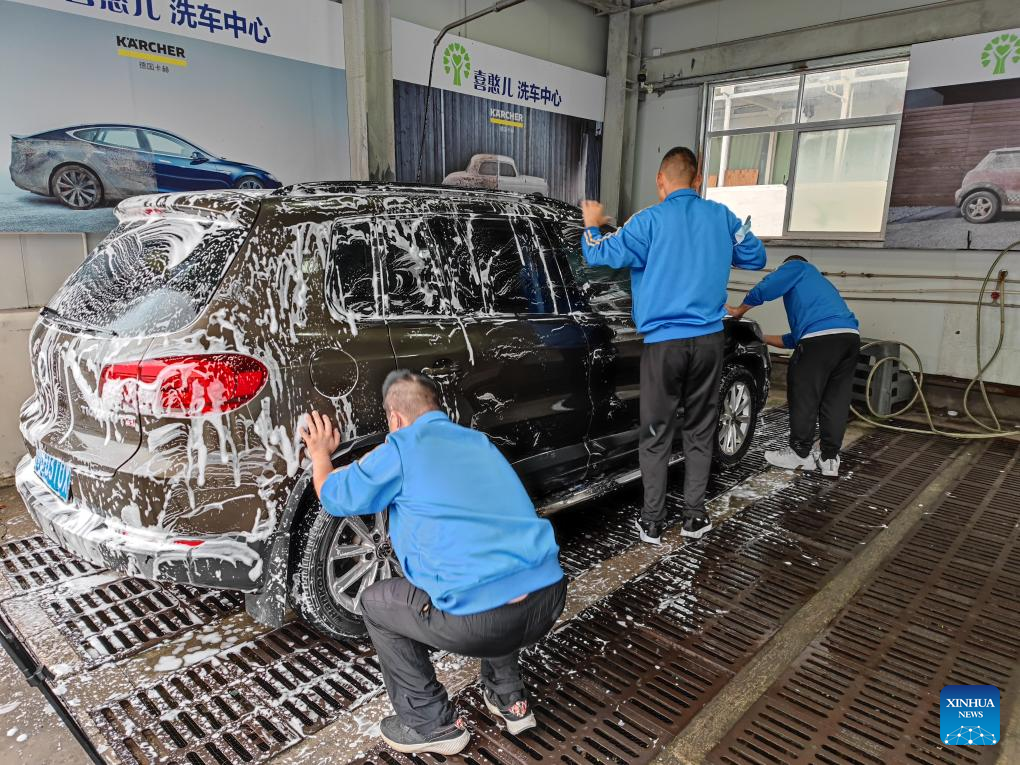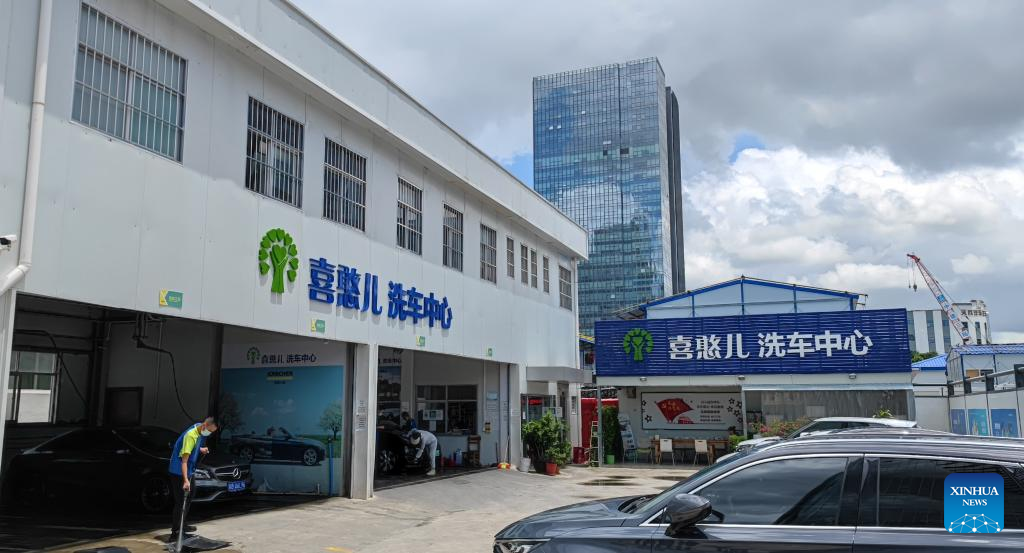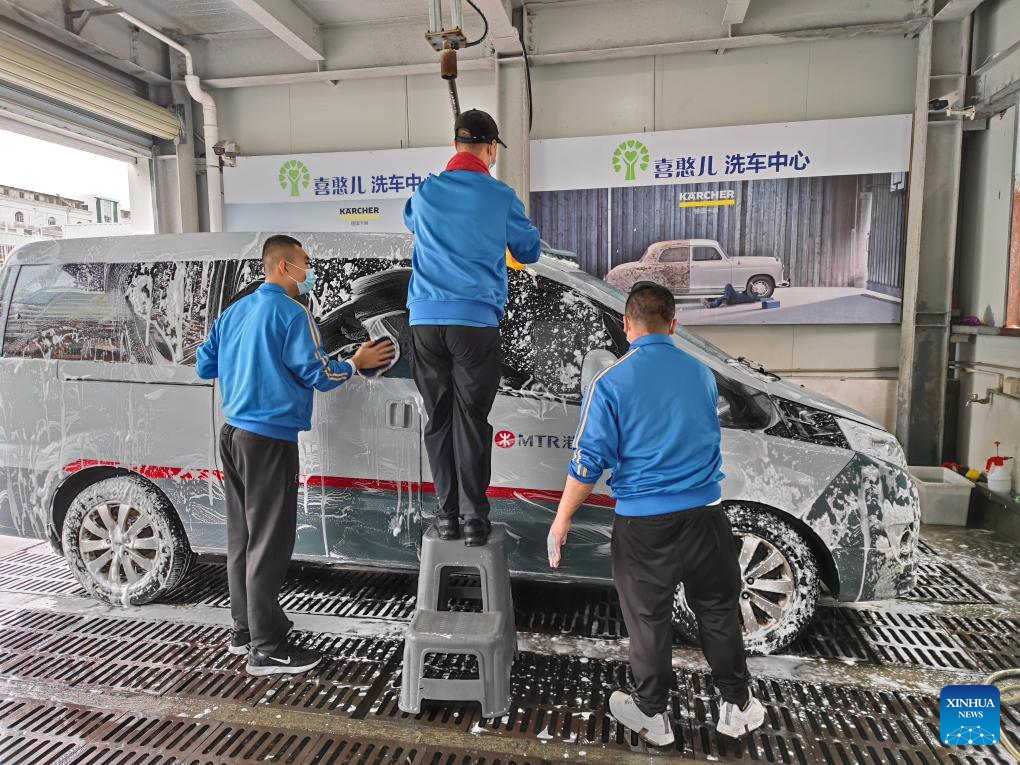
Mentally challenged employees work at a car wash named Xihaner in Shenzhen, south China's Guangdong Province, Nov. 26, 2022. (Xinhua)
by Xinhua writers Lyu Qiuping and Li Xiaoling
SHENZHEN, June 19 (Xinhua) -- At a car wash nestled within the bustling city of Shenzhen, a group of employees greets the morning at 8 a.m., kicking off their day with a self-devised routine. They spray water, lather foam and sway to the beat of lively music, treating the task of washing cars as if it were a delightful game.
The car wash is named Xihaner, meaning happy simple-minded children, an apt description of the mentally challenged employees who work there. Their average age is 26, but their intellectual capacities are akin to that of 7-year-old children.
In nearly a decade, the Xihaner team has grown from eight members to a group of 15, and has collectively washed over 100,000 vehicles. In doing so, they have not only earned their wages but also crafted lives of independence and dignity.
China is home to approximately 12 million individuals with intellectual disabilities, a group beset by developmental challenges that limit their employment rate to a mere 10 percent. Conditions such as autism, Down syndrome and cerebral palsy set them apart, yet the Xihaner Car Wash Center defies these daunting odds.
"While our workers do face certain challenges, they are able to match the cleanliness and prices of any other car wash," said Cao Jun, founder of the center.
STAND ON OWN FEET
Cao himself is the father of an intellectually challenged child.
In 2002, his seven-month-old son was diagnosed with "developmental retardation," with doctors predicting that the intellectual level of his son would peak at six to seven years old.
This devastating news was a heavy blow to Cao and his wife.
Cao was so anxious that he would avoid drinking water before bed for fear of waking up worried in the middle of the night. "What if my wife and I pass away one day, leaving behind our son who will never fully grow up," he could not help thinking.
The couple had considered having another child but later gave up the idea. "We could be distracted if we had a second baby, who would also have to support his or her elder brother in the future. It would have been unfair for both of them," he explained.
Cao initially aimed to save money for the child before he realized that compared with a financial future, it was more important for his son to have a life of dignity and contribution.
In August 2015, Cao, along with nine other parents facing similar challenges, pooled their resources to crowdfund the opening of the car wash. The initiative began with eight graduates from a local special education school, while Cao's son joined the ranks in 2020 after graduation.
"Car washing doesn't require high technical skills or much investment. They can make it work if properly trained," Cao said.
However, things initially did not go smoothly, as the "clean" standard was different in the eyes of the Xihaners.
"They thought the car was already clean enough as long as they had basically washed it," he said.
Cao then hired a professional trainer, who divided the car into 18 sections for the workers to wash individually. They also separated the workers based on their level of intellectual disability, with each one being responsible for a particular part of the work. Soon, the team was able to achieve a competitive service speed, washing a car in 20 to 30 minutes.
Cao and the trainer also guided them on how to dress appropriately, greet customers politely, and communicate normally with them.
Each Xihaner earns 2,360 yuan (about 332 U.S. dollars) a month, and every month when they get their pay, they invite each other to have soft drinks together, thereby sharing their sense of achievement with others.
Cao's philosophy extends beyond financial sustainability. It also champions a culture of self-reliance, with a firm policy against accepting tips, reinforcing the message that the Xihaners are defined by their work, not their disabilities. In China, offering tips is not a common practice.
"The less special you claim to be, the more people will accept you," said Cao.
Their commitment to excellence has earned them a loyal customer base and glowing reviews on Dianping, the Chinese version of Yelp.
"It's been a long time since I've seen so many smiling faces. It's so good. Will visit again," said a post.
SPREADING SEEDS OF HOPE
Thanks to the sustained smooth operation of the car wash, many parents with intellectually challenged children from across the country have paid visits to learn more about the venture, and Cao is delighted to share the professional competence assessment system, training content and job assignment system with them free of charge.
Supported by Cao's car wash and the local provincial disabled persons' federation, another Xihaner car wash center went operational in Qinghai Province in 2016, hiring 16 people with mental disabilities.
In May 2022, the China Disabled Persons' Federation issued a document supporting the promotion of the Xihaner car wash project nationwide.
By the end of last year, the number of Xihaner car wash centers had reached 42 across China, with more than 400 mentally disabled people employed in many cities including Nanjing, Hefei, Altay and Chifeng.
Zhou Lingang, executive director of the research center for the development of disabled persons at Shenzhen University, said that the Xihaner car wash service model has been rapidly promoted and replicated nationwide, breaking the employment barrier for people with intellectual disabilities.
It has explored a path that is socialized and market-oriented and has also activated local resources in different areas according to local conditions, such as the disabled persons' federation and caring enterprises, said Zhou.
Zhou's research team thoroughly investigated the Xihaner car wash model and drafted a guide to professional car washing services for people with mental disabilities. The guide is expected to be released as a group standard soon.
Although the other car wash centers have no financial relations with Cao's car wash in Shenzhen, Cao hopes more such facilities will open.
"If 1,000 such places are operational, they can help some 10,000 families with mentally-disabled children," he said. ■

This photo taken on Aug. 26, 2022 shows a view of the car wash named Xihaner in Shenzhen, south China's Guangdong Province. (Xinhua)

Mentally challenged employees work at a car wash named Xihaner in Shenzhen, south China's Guangdong Province, Nov. 26, 2022. (Xinhua)



